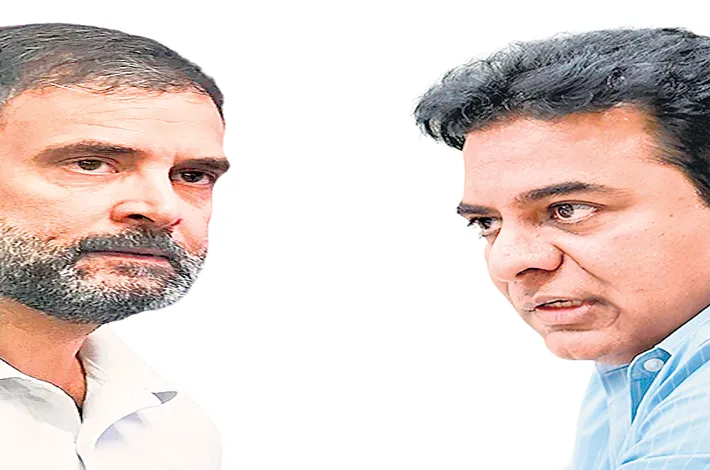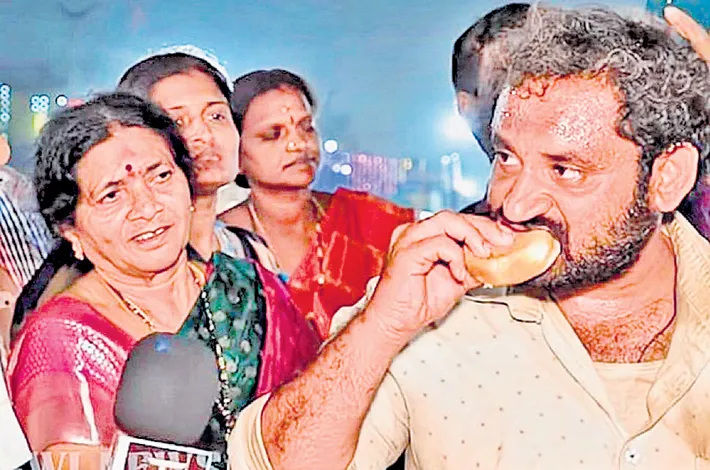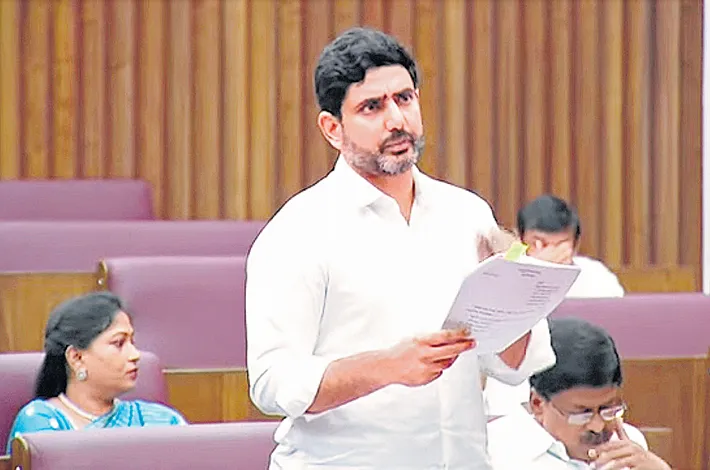CEC, VCs are immune from facing any cases
19-08-2025 12:00:00 AM

The Chief Election Commissioner and other Election Commissioners Bill, 2023
Then why did you change that law...???
■ Why did the government change it?
■ Do you know that no case can be filed against the Election Commissioner?
■ Do you know when this law was made...??
■ This law was made in 2023.
■ Why was this law made in 2023..??
■ Because Modi and Amit Shah want that no action can be taken against the EC.
■ Because the Election Commission is helping them and is doing #VoteChori with them."
Yes! We need an SIR!
■ The Special Intensive Revision not of the electoral rolls but of the Election Commission of India itself
■ Today's press conference left us with more questions than answers. Chief Election Comissioner’s explanations seem more like excuses than solutions
■ The only thing that we clearly now know is that the Election Commission of India (ECI) which is supposed to safeguard the democratic process seems to be functioning as an extended arm of the NDA —BRS Working President KTR
■ If the ECI acknowledges discrepancies in the voter list, shouldn't they also accept the dereliction of their duties?
■ It is high time that we demand a revision not of the voter list but a revision of ECI appointment process…a clinical overhaul of the system so that we can still continue to call ourselves a democracy
metro india news I hyderabad
Not many are aware that the Chief Election Commissioner and Election Commissioners are protected from any criminal, Civil cases against them. In the waning days of the Winter Session of Parliament in 2023, the Bharatiya Janata Party (BJP)-led government passed the Chief Election Commissioner and Other Election Commissioners (Appointment, Conditions of Service and Term of Office) Bill, 2023, a piece of legislation that has since sparked intense debate and controversy.
The bill, swiftly notified on January 2, 2024, introduced significant changes to the appointment process and service conditions of the Chief Election Commissioner (CEC) and Election Commissioners (ECs) in India. Among its most contentious provisions is a clause granting immunity to these officials from civil or criminal proceedings for actions taken in the discharge of their official duties. Critics, including opposition leaders, have labeled this clause a deliberate move to shield potential misconduct, while supporters argue it protects Election Commission of India (ECI) officials from frivolous lawsuits. As allegations of electoral manipulation swirl, particularly targeting CEC Rajiv Kumar, the bill’s implications for India’s democratic framework demand closer scrutiny.
The Bill: Context and Provisions
The Chief Election Commissioner and Other Election Commissioners Bill, 2023, replaced the Election Commission (Conditions of Service of Election Commissioners and Transaction of Business) Act, 1991. It was introduced in the Rajya Sabha on August 10, 2023, passed by both houses by December 21, and received presidential assent on December 28, 2023.
The legislation aimed to formalize the appointment process for the CEC and ECs, addressing a long-standing legislative gap noted by the Supreme Court in the landmark Anoop Baranwal v. Union of India (2023) case. In that ruling, the Court mandated that appointments to the ECI be made by a committee comprising the Prime Minister, the Leader of the Opposition in the Lok Sabha, and the Chief Justice of India (CJI) until Parliament enacted a law. The Court emphasized the need for an independent ECI to ensure free and fair elections, a cornerstone of India’s democracy.
However, the 2023 bill diverged from the Supreme Court’s directive. It established a selection committee comprising the Prime Minister, the Leader of the Opposition in the Lok Sabha, and a Union Cabinet Minister nominated by the Prime Minister, notably excluding the CJI. This change raised concerns about government dominance in the appointment process, as two of the three committee members are aligned with the ruling party. Additionally, the bill equated the salary and conditions of service of the CEC and ECs to those of a Supreme Court judge, reversing an earlier proposal to align them with the Cabinet Secretary, which critics argued would have subjected the ECI to greater executive influence.
The immunity clause, a focal point of controversy, stipulates that no court shall entertain civil or criminal proceedings against current or former CECs and ECs for acts done in the discharge of their official duties. This provision, supporters claim, protects ECI officials from vexatious litigation that could hamper their ability to make impartial decisions. However, critics argue it creates a dangerous precedent, potentially shielding misconduct under the guise of official duty.
Allegations of Manipulation and Political Backlash
The timing of the bill’s passage—just months before the 2024 general elections—fueled suspicions of ulterior motives. Opposition parties, including the Indian National Congress, have accused the BJP of using the legislation to manipulate the ECI’s functioning. Posts on X, reflecting public sentiment, allege that the BJP “made the law to protect criminals” and then leveraged the ECI to “steal people’s mandate.”
These claims point to the rapid appointment of two new Election Commissioners, Gyanesh Kumar and Sukhbir Singh Sandhu, in March 2024, following the resignation of Election Commissioner Arun Goel and the retirement of Satish Chandra Pandey. The selection process, critics argue, lacked transparency, with Leader of the Opposition Adhir Ranjan Chowdhury claiming he was given the shortlisted names just minutes before the committee’s meeting.
Further fueling discontent are allegations that CEC Rajiv Kumar, who has led the ECI since 2022, was complicit in electoral irregularities during the 2024 elections. Opposition leaders, including Rahul Gandhi, have pointed to the immunity clause as evidence of a premeditated strategy to shield ECI officials from accountability. A post by the Congress Kerala unit on X stated, “When we come back to power, these laws will be removed retrospectively, and those who took part in these crimes will be sent to where criminals belong.” Reports also suggest that opposition parties, particularly the INDIA bloc, are contemplating an impeachment motion against Kumar, though such a move faces significant hurdles, as the CEC can only be removed through a process akin to that of a Supreme Court judge, requiring a parliamentary majority.
The Immunity Clause: Protection or Peril?
The immunity clause has become a lightning rod for criticism. Legal experts argue that while protecting ECI officials from frivolous lawsuits is necessary, blanket immunity risks undermining accountability. The clause’s broad phrasing could potentially shield actions that overstep legal or ethical boundaries, provided they are framed as part of official duties. This concern is amplified by the ECI’s quasi-judicial role, which includes resolving disputes over political party splits and mergers, making impartiality paramount.
Comparatively, other democracies balance protection with accountability differently. In South Africa, the Electoral Commission’s members are appointed with input from diverse stakeholders, including the Constitutional Court president, ensuring broad representation. In the U.K., parliamentary approval adds scrutiny to appointments, while in the U.S., Senate confirmation serves as a check. India’s new selection committee, dominated by government representatives, lacks similar checks, raising fears of executive overreach.
The Road Ahead: Legal and Political Challenges
The bill’s provisions are currently under judicial scrutiny. Petitions filed by Dr. Jaya Thakur and the Association for Democratic Reforms challenge the exclusion of the CJI from the selection committee, arguing it violates the Anoop Baranwal ruling. The Supreme Court, led by Justice Surya Kant, is set to hear these cases, with substantial arguments pending as of July 2025. The Court’s decision could reshape the ECI’s appointment process and clarify the immunity clause’s scope.
Politically, the controversy has deepened mistrust in the ECI’s independence. The opposition’s vow to repeal the law retrospectively signals a potential overhaul if they return to power. However, such a move would face legal and procedural challenges, particularly regarding retrospective application. Meanwhile, public discourse on X reflects growing frustration, with users like
@punitjuneja alleging, “BJP: Made law to shield ECs. Then used ECs to steal votes.”
The Chief Election Commissioner and Other Election Commissioners Bill, 2023, was intended to fill a legislative void in the ECI’s appointment process. However, its exclusion of the CJI, combined with the immunity clause, has cast a shadow over its intent. While the government defends the bill as a step toward transparency, critics see it as a tool for consolidating executive control over a vital democratic institution. As legal challenges unfold and political rhetoric intensifies, the bill’s legacy will depend on whether it strengthens or undermines India’s electoral integrity. For now, the debate underscores a broader struggle to balance institutional independence with accountability in the world’s largest democracy.








